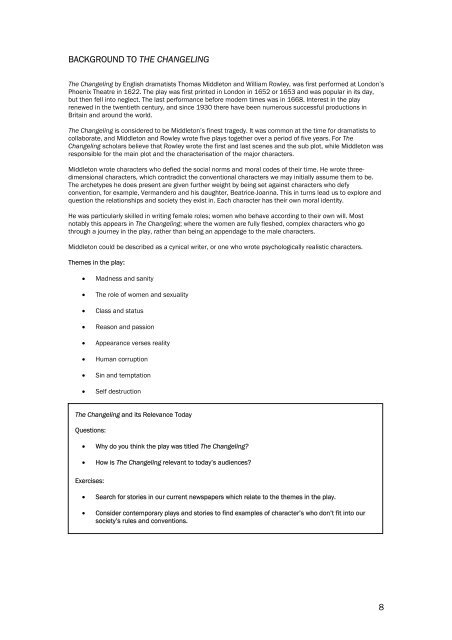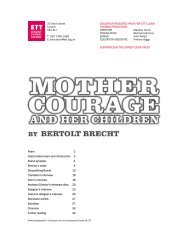Download The Changeling Education Pack - English Touring Theatre
Download The Changeling Education Pack - English Touring Theatre
Download The Changeling Education Pack - English Touring Theatre
Create successful ePaper yourself
Turn your PDF publications into a flip-book with our unique Google optimized e-Paper software.
BACKGROUND TO THE CHANGELING<br />
<strong>The</strong> <strong>Changeling</strong> by <strong>English</strong> dramatists Thomas Middleton and William Rowley, was first performed at London’s<br />
Phoenix <strong>The</strong>atre in 1622. <strong>The</strong> play was first printed in London in 1652 or 1653 and was popular in its day,<br />
but then fell into neglect. <strong>The</strong> last performance before modern times was in 1668. Interest in the play<br />
renewed in the twentieth century, and since 1930 there have been numerous successful productions in<br />
Britain and around the world.<br />
<strong>The</strong> <strong>Changeling</strong> is considered to be Middleton’s finest tragedy. It was common at the time for dramatists to<br />
collaborate, and Middleton and Rowley wrote five plays together over a period of five years. For <strong>The</strong><br />
<strong>Changeling</strong> scholars believe that Rowley wrote the first and last scenes and the sub plot, while Middleton was<br />
responsible for the main plot and the characterisation of the major characters.<br />
Middleton wrote characters who defied the social norms and moral codes of their time. He wrote three-<br />
dimensional characters, which contradict the conventional characters we may initially assume them to be.<br />
<strong>The</strong> archetypes he does present are given further weight by being set against characters who defy<br />
convention, for example, Vermandero and his daughter, Beatrice-Joanna. This in turns lead us to explore and<br />
question the relationships and society they exist in. Each character has their own moral identity.<br />
He was particularly skilled in writing female roles; women who behave according to their own will. Most<br />
notably this appears in <strong>The</strong> <strong>Changeling</strong>; where the women are fully fleshed, complex characters who go<br />
through a journey in the play, rather than being an appendage to the male characters.<br />
Middleton could be described as a cynical writer, or one who wrote psychologically realistic characters.<br />
<strong>The</strong>mes in the play :<br />
• Madness and sanity<br />
• <strong>The</strong> role of women and sexuality<br />
• Class and status<br />
• Reason and passion<br />
• Appearance verses reality<br />
• Human corruption<br />
• Sin and temptation<br />
• Self destruction<br />
<strong>The</strong> <strong>Changeling</strong> and its Relevance Today<br />
Questions:<br />
• Why do you think the play was titled <strong>The</strong> <strong>Changeling</strong>?<br />
• How is <strong>The</strong> <strong>Changeling</strong> relevant to today’s audiences?<br />
Exercises:<br />
• Search for stories in our current newspapers which relate to the themes in the play.<br />
• Consider contemporary plays and stories to find examples of character’s who don’t fit into our<br />
society’s rules and conventions.<br />
8





